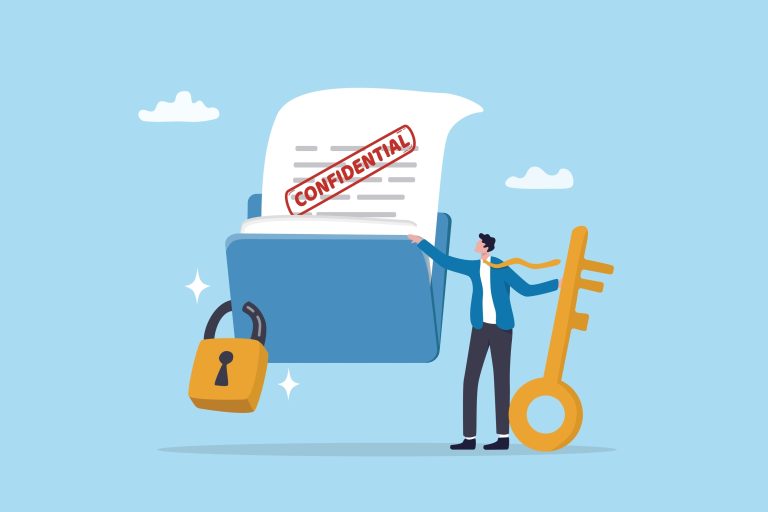Are you pitching game-changing ideas for tenders or investment opportunities? Do your employees handle sensitive client details or unique company know-how? Does your manufacturer know the intricate ins-and-outs of your products or supplier relationships? If so, you’re dealing with confidential information – the lifeblood of innovation, trust, and competitive edge.
But here’s the thing, not all secrets are automatically protected by intellectual property (IP) laws. That’s where the law of confidential information comes to the rescue, ensuring your hard-earned insights and trade secrets stay under wraps.
What Counts as Confidential Information?
Let’s start with the basics. Confidential information is essentially any non-public data that carries commercial value. It’s what keeps your business ahead of the competition and your ideas safe from opportunists. Examples include:
Business Plans
Your roadmap to success, from strategic goals to market-entry tactics.
Client Lists
Your treasure trove of relationships and contacts.
Trade Secrets
Those “special sauce” formulas or unique processes that set you apart.
Designs and Ideas
Innovations that haven’t yet seen the light of day.
While it’s clear these are valuable assets, protecting them legally hinges on meeting three key criteria:
Is the Information Confidential by Nature? It should be something not publicly available and of genuine commercial value. If it’s a simple, obvious idea anyone could replicate, it’s unlikely to qualify.
Was the Information Shared in Confidence? This can occur in several ways:
- Via Contracts – Non-disclosure agreements (NDAs) explicitly outline what’s confidential.
- Through Reasonable Expectations – Even without an NDA, circumstances can imply confidentiality (e.g., sharing a secret recipe with a trusted partner).
- By Relationship – Certain relationships, such as employer-employee or lawyer-client, naturally come with an expectation of confidentiality.
Has the Information Been Misused? If someone uses or discloses your confidential data without permission, causing harm, you may have grounds for a legal claim. Potential remedies include injunctions to stop further misuse and financial damages.
Why Bother Protecting Confidential Information?
In a world where knowledge is power, failing to protect confidential information can lead to devastating consequences. Imagine your competitors getting their hands on your business plans or a former employee taking your client list to a rival firm. Worse yet, what if a manufacturer starts producing knockoffs of your design?
Don’t let your hard work and ingenuity fall into the wrong hands. With the right strategies, you can keep your secrets safe and your competitive edge sharp.
Pro Tips to Safeguard Your Secrets
Lock It Down
Think of your confidential information as a crown jewel. Store it securely using robust digital and physical measures. This could include encrypted files, secure servers, password-protected access, and restricted entry to sensitive areas.
NDAs Are Your Best Friend
Before sharing sensitive information, make sure all parties sign a non-disclosure agreement. NDAs formalize the understanding that your data is top-secret and establish clear consequences if someone breaches the trust.
Label It Clearly
Don’t leave anything open to interpretation. Stamp your documents with “CONFIDENTIAL” in bold, unmistakable letters. This ensures everyone handling the information knows it’s not for public consumption.
Educate and Empower Your Team
Your employees are your first line of defense. Train them on how to handle sensitive information and stress the importance of confidentiality. Regular refreshers can go a long way in preventing accidental leaks.
Maintain Control
Always know where your information is and who has access to it. When employees leave your organization, ensure all confidential documentation is returned or securely destroyed. It’s also a good idea to conduct periodic audits to confirm your data hasn’t gone astray.
Real-World Example: When Confidentiality Goes Wrong
Here’s a cautionary tale: A startup founder shared a groundbreaking app idea with a potential investor without an NDA. The investor decided not to fund the project but later launched a similar app. Without formal confidentiality agreements in place, the founder had little legal recourse. Don’t let this happen to you! A simple NDA could have saved the founder years of regret (and possibly a legal battle).
When to Seek Expert Advice
Sometimes, protecting your confidential information gets tricky. Are you unsure if your information meets the legal criteria? Or maybe you suspect someone has breached confidentiality? This is where expert legal advice becomes invaluable. Specialist intellectual property lawyers can help you assess your case, draft airtight NDAs, and take action if your rights have been violated.
Let’s Talk About Your Protection Plan
Your ideas are worth protecting. Whether you’re a business owner, creative professional, or inventor, understanding the nuances of confidential information is critical. Need help creating a solid confidentiality strategy or tackling a potential breach? Arrange a consultation with expert IP lawyers in London like Briffa Legal.


